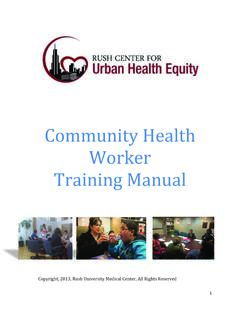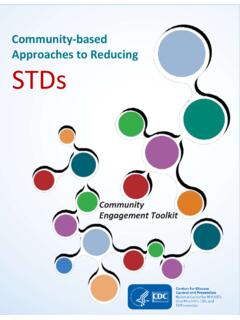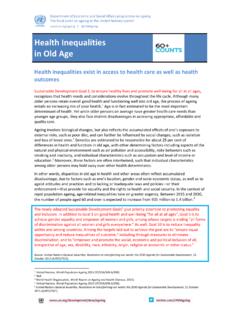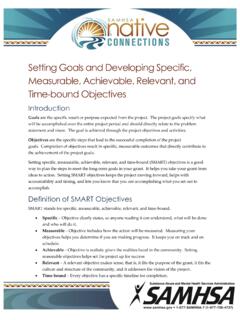Transcription of The Facilitator’s Guide
1 1 The Facilitator s Guide Culturally Competent Nursing Care: A Cornerstone of Caring The Facilitator s Guide Culturally Competent Nursing Care: A Cornerstone of Caring Office of Minority health US Department of health and Human Services 2 The Facilitator s Guide Culturally Competent Nursing Care: A Cornerstone of Caring Table of Contents Introduction .. 4 Target Audience .. 6 Learning Objectives .. 6 CNE/CEU Information .. 6 The Facilitator s Roles and Responsibilities .. 7 Facilitator s Toolbox .. 8 Using The Facilitator s Guide .. 10 Sample Layout .. 11 Supplementary Vignettes and Presentation Package .. 13 Video Case Studies .. 13 Course Administration/System Requirements .. 17 Training Setting .. 17 Facilitator s Time by Session .. 17 Course Equipment .. 17 Facilitator s Toolkit Instructional 19 Course I Delivering Culturally Competent Care.
2 23 Course I Presentation .. 23 Course I Handouts .. 88 Course II Using Language Access Services .. 89 Course II Presentation .. 89 Course II Handouts .. 174 Course III Supporting and Advocating for Culturally Competent health Care Organizations .. 175 Course III Presentation .. 175 Course III Handouts .. 242 Why Culture Matters A Guide to Marketing Culturally Competent Nursing Care: A Cornerstone of Caring .. 243 Introduction .. 244 3 The Facilitator s Guide Culturally Competent Nursing Care: A Cornerstone of Caring Handouts Course I .. 285 Handout I-1: Role-Playing 286 Handout I-2: Self-Assessment Checklist: Promoting Cultural Diversity and Cultural Competence .. 287 Handout I-3: Dissolving Stereotypes .. 291 Handout I-4: Story From the Frontline: The Medicine Bundle .. 292 Handout I-5: Story From the Frontline: Helen Birdsong.
3 293 Handouts Course II .. 294 Handout II-1: Role-Playing Activity .. 295 Handout II-2: Communication Models .. 297 Handout II-3: BATHE Communication Model .. 301 Handout II-4: Story From the Frontline: Mrs. Tran .. 302 Handout II-5: Story From the Frontline: Tanaka Kenji .. 303 Handout 11-6: Triadic Interview Process .. 304 Handout II-7: Checklist for Working With Interpreters .. 305 Handout II-8: Sample Text for Analysis Using SMOG Formula .. 307 Handout II-9: Role-Playing Activity .. 309 Handout II-10 : Story From the Frontline Salvadoran Patient .. 310 Handouts Course III .. 311 Handout 111-1: Self-Assessment List .. 312 Handout III-2: Organizational Assessment Checklist .. 313 Handout III-3: Role-Playing Activity .. 315 Handout III-4: Role-Playing Activity .. 316 References .. 317 4 The Facilitator s Guide Culturally Competent Nursing Care: A Cornerstone of Caring Introduction Nurses spend more tim e in direct patient care than any other t ype of health professi onal and, as such, are in a un ique positi on to im prove access to care, quality of care, and health outcomes for all patie nts, part icularly those at risk for racial and ethnic health di sparities.
4 The nee d f or nurses to be trained in cultural competency and be prepared to effe ctiv el y treat racial and ethnic minorities grows m ore crucial as our nation becomes more diverse. Cultural competency education may minim ize potent ial negative outco mes associated with cul tural and language barrie rs, a major cause of health care disparities . The Office of Minority health (OMH) at the Department of Heal th and Human Serv ice s (HHS) has b een at the forefront of cul tural competency education as a strategy to combat health di sparities, dev eloping a su ite of cul tural competency continu ing e ducation p rograms and re sources for health care providers calle d the Think Cultural health suite. These accredited programs are grounded in OMH s National Standards for Culturally and Linguisticall y Appropriate Se rvices in Heal th Care, or CLAS Standards, which were dev el oped by OMH to provide a much-needed alternative to the patchwork of in de pe nd ent ly develop ed definitions, practice s, and re qu ir ements concern in g the CLAS standards.
5 The C LAS Standards were released in Dec embe r 2000 as a means to corre ct inequ ities that current ly exi st in the provisi on of health serv ice s and to make these service s more responsive to the i nd ivi dual needs of all patie nts. As a follow-up initiative to assist health care organizations in the adoption of the CLAS Standards, OMH contracted with SRA International, Inc. to develop the aforementioned cultural competency continuing education programs, including Culturally Competent Nursing Care: A Cornerstone of Caring. This educational program is a self-directed, e-learning Continuing 5 The Facilitator s Guide Culturally Competent Nursing Care: A Cornerstone of Caring Nursing Education (CNE) accredited curriculum that helps nurses develop cultural and linguistic competencies required to improve the quality of care for ethnically diverse communities.
6 The program is comprised of three courses: (1) Delivering Culturally Competent Nursing Care; (2) Using Language Access Services; and (3) Supporting and Advocating for Culturally Competent health Care Organizations. The curriculum was endorsed by the American Nurses Association, and as emphasized by Rebecca M. Patton, ANA President, the OMH curriculum offers nurses the most comprehensive program regarding culturally competent nursing care. Culturally Competent Nursing Care underwent a rigorous 3-year development process that included the following phases: A needs assessment comprised of focus groups and development of an Environmental Scan; ongoing input from a National Project Advisory Committee; a Consensus-Building process; and pilot and field testing of draft curricula and case studies throughout the country with practicing nurses and nurses in academic settings.
7 The program was launched in March 2007 and is available online at As a companion to the online Culturally Competent Nursing Care program, OMH sought to create this Facilitator s Guide , to allow individuals who have completed the curriculum in full to lead groups of their colleagues through the program in small group sessions. The Guide will help you create a stimulating learning environment through interactive content presentation and facilitation techniques. Using this Guide , you will be able to serve in the role of training facilitator to assist participants in developing cultural competency skills and in planning for the administrative requirements related to course delivery. The Facilitator s Guide can enhance cultural competence training within your organization by providing key learning points and a variety of interactive activities aimed at developing cultural competence skills and facilitating meaningful discussion.
8 You will also be provided with the information necessary to be able to use the technology features to enhance your training sessions. Instructions and tips for facilitating group training sessions and presentations, participant resources and handouts, and presentation slides in PDF format are available in the enclosed materials. Additionally, this Guide includes materials to support a marketing presentation that you can make in order to increase your colleagues awareness about cultural competency and determine their comfort level in using the online program on their own. 6 The Facilitator s Guide Culturally Competent Nursing Care: A Cornerstone of Caring Target Audience This continuing education activity will benefit nurses, social workers, and other professional and administrative support staff in the support of their provision of quality health care.
9 Learning Objectives At the conclusion of the Culturally Competent Nursing Care program, participants will be able to: Define issues related to cultural competency in nursing practice Identify strategies to promote self-awareness about attitudes, beliefs, biases, andbehaviors that may influence the nursing care they provide Devise strategies to enhance skills toward the provision of culturally competent nursingcare Demonstrate the advantages of the adoption of the CLAS Standards as appropriate intheir nursing practiceCNE/ CEU Information After attending each course, participants must complete the posttests at the course Test Center. Participants are eligible to receive three credits for successfully completing each course. To receive credit, training participants must do the following: Complete the registration form Complete the pretest Complete the posttest with 70 percent or higher score Submit the continuing education evaluationCNE and continuing education (CEU) certificates and statements of credit are automatically generated by the computer in PDF upon completion of continuing education requirements.
10 7 The Facilitator s Guide Culturally Competent Nursing Care: A Cornerstone of Caring The Facilitator s Roles and Responsibilities As a cultural competence training facilitator, you will Guide a group of health care providers through the Culturally Competent Nursing Care program. The Guide contains key learning concepts and suggests interactive activities. Suggested activities will help you leverage rich participant experiences with cultural diversity and cultural competence into developing new knowledge, skills, and attitudes. As a prerequisite for facilitating cultural competence training at your organization, you must complete the Culturally Competent Nursing Care curriculum. You will also need to review the materials in this Guide and the supplementary webpages. At the same time, you are not expected to be an expert in the field of cultural competence or this training program.






